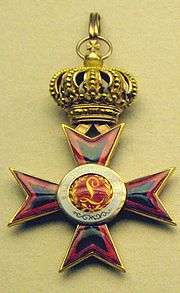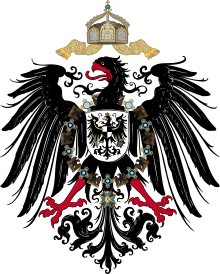Ludwig Order
The Ludwig Order (German:"Ludwigsorden"), was an order of the Grand Duchy of Hesse which was awarded to meritorious soldiers and civilians from 1807 to 1918.
| Ludwig Order Ludwigsorden | |
|---|---|
 The badge of the Grand Cross | |
| Awarded by | |
| Type | Order |
| Eligibility | soldiers and civilians |
| Awarded for | merit |
| Status | defunct |
| Sovereign | Grand Duke of Hesse |
| Grades | • Grand Cross • Commander 1st Class • Commander 2nd Class • Knight 1st Class • Knight 2nd Class |
| Statistics | |
| Last induction | 1918 |
| Precedence | |
| Next (higher) | House Order of the Golden Lion |
| Next (lower) | Order of Philip the Magnanimous |
Ribbon bar of the order | |
History
The order was founded by Louis I, Grand Duke of Hesse and by Rhine as an order of merit without name or statute on August 25, 1807. On December 14, 1831 statutes were adopted for the order, giving it its formal name, dividing it into five classes, and setting the terms for award. It was to be awarded to meritorious soldiers and civilians "von den obersten Stufe bis auf die unterste" (from the highest level to the lowest).
The order became obsolete with the abdication of the last Grand Duke of Hesse in November 1918.
Classes
The order was divided into five classes:
- Grand Cross
- Commander 1st Class
- Commander 2nd Class
- Knight 1st Class
- Knight 2nd Class
Notable recipients
- William I, German Emperor (1838) - German Emperor (1871-1888) and King of Prussia (1861-1888).
- Alexander II of Russia (1839) - Tsar of Russia (1855-1881).
- Adolph, Duke of Nassau (1843) - last Duke of Nassau (1839-1866), later Adolphe, Grand Duke of Luxembourg (1890-1905)
- Franz Joseph I (1851) - Emperor of Austria (1848-1916)
- Alexander Mikhailovich Gorchakov (1857) - Russian minister of foreign affairs and later chancellor of Russia (1863-1882).
- William III of the Netherlands (1858) - King of the Netherlands and Grand Duke of Luxembourg (1849–1890).
- Albert Edward, Prince of Wales and Duke of Saxe-Coburg-Gotha (1862) - later King Edward VII of the United Kingdom.
- Ludwig II of Bavaria (1863) - King of Bavaria (1864-1886)
- Leopold II of Belgium (1865) - King of the Belgians (1865-1909)
- Carol I of Romania (1869) - Prince and later King of Romania (1866-1914)
- Louis Mountbatten, 1st Marquess of Milford Haven (1870) - nephew of Louis III, Grand Duke of Hesse
- Alexander, Prince of Bulgaria (1870) - nephew of Louis III, Grand Duke of Hesse
- Otto von Bismarck (1871) - Chancellor of Germany (1871-1890)
- Helmuth von Moltke the Elder (1871) - German field marshal and strategist; Chief of the Prussian General Staff during the wars of German unification.
- Karl Eberhard Herwarth von Bittenfeld (1871) - German field marshal during the wars of German unification.
- Benedict Samuel Levi (1872) - Rabbi at Giessen and Professor at the University of Würzburg.
- Karl Schlösser (1874) - German artist living in London.
| Wikimedia Commons has media related to Ludwigsorden. |
gollark: If they were cheap enough they would probably be used *everywhere*.
gollark: <@!336962240848855040> Superconducting magnetic energy storage thingies are a useful application, and you could have power grids with significantly lower energy loss.
gollark: https://en.wikipedia.org/wiki/Mercury_in_fish
gollark: It says here that it's present a bit in seawater, absorbed by algae, and then fish absorb it but don't get rid of it, and it continues going through the food chain.
gollark: Isn't it in the things they eat, or something? I will consult the interwebs.
References
- Maximilian Gritzner,Handbuch der Ritter- und Verdienstorden", Leipzig 1893
This article is issued from Wikipedia. The text is licensed under Creative Commons - Attribution - Sharealike. Additional terms may apply for the media files.
